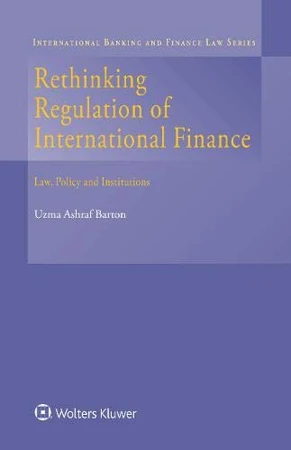Rethinking Regulation of International Finance – Law, Policy and Institutions

Blurb
International Banking and Finance Law series-33
About this book:
Rethinking Regulation of International Finance encapsulates the most important aspects of the development and operation of the international financial system. This book questions the fundamental basis of the existing international financial architecture (soft law) and explores the need for a compliance-based model based on legitimacy of regulations and accountability of the regulatory bodies in international financial stability. Why have financial standards and institutions almost always failed to effectively predict and respond to real-world financial crises? The answer, as this challenging book shows, is that international financial law suffers from a persistent lack of judicial or quasi-judicial enforcement mechanisms, leaving flaws in the structure of the international financial system that lead inevitably to excesses that threaten the public good of global financial stability. The author, an internationally renowned legal expert on financial and fiscal reforms, responds to the increasingly urgent call for rethinking the structure and the functioning of international financial law and argues that a resilient procedural mechanism with judicious regulatory substance can make the financial system safer for all actors, including the taxpayers of not only the Member States but also the unrepresented countries. To this end, the book suggests short-to-medium term reforms within the existing financial system and for longer-term it recommends an unconventional alternative that takes risk away from the market and thereby makes every stakeholder accountable to the system.
What's in this book:
This book asserts that the existing financial architecture repeatedly fails to safeguard the essential public good of financial stability and this failure perpetuates higher risks in financial markets. Centering on the concept of enforcement - which continues to be an unresolved issue in the discipline of international financial law - the analysis describes the likely contours of hard-law regulatory reform. It weighs the pros and cons of much-talked-about regulatory and policy issues such as the following and more:
- policy implications from the transformation of finance from a domestic to an international concept;
- new or revised supervisory and regulatory bodies with redefined mandate, jurisdictions and powers;
- possibility of a treaty-based structure similar to the European Union's integration framework; and
- consolidation of crisis-prevention and crisis-management policies.
The analysis takes into account instances from trade and monetary systems pertinent to the development of the discipline of international financial law. The concluding chapter explores possibilities for putting in place an asset-backed resilient financial system based on risk sharing that is empowered to legislate reform and authorized to seek compliance from its members.
How this will help you:
With its provision of unconventional alternatives for further development of international financial law to realize stable, predictable and robust international markets - including early-warning systems and fully primed crisis-prevention mechanisms - the book explores the essential link between global financial stability, effective regulation and institutional development that will engender realistic global policy solutions. It will prove to be of great importance to regulatory and legal practitioners as well as to academic and think-tank scholars, and students.

